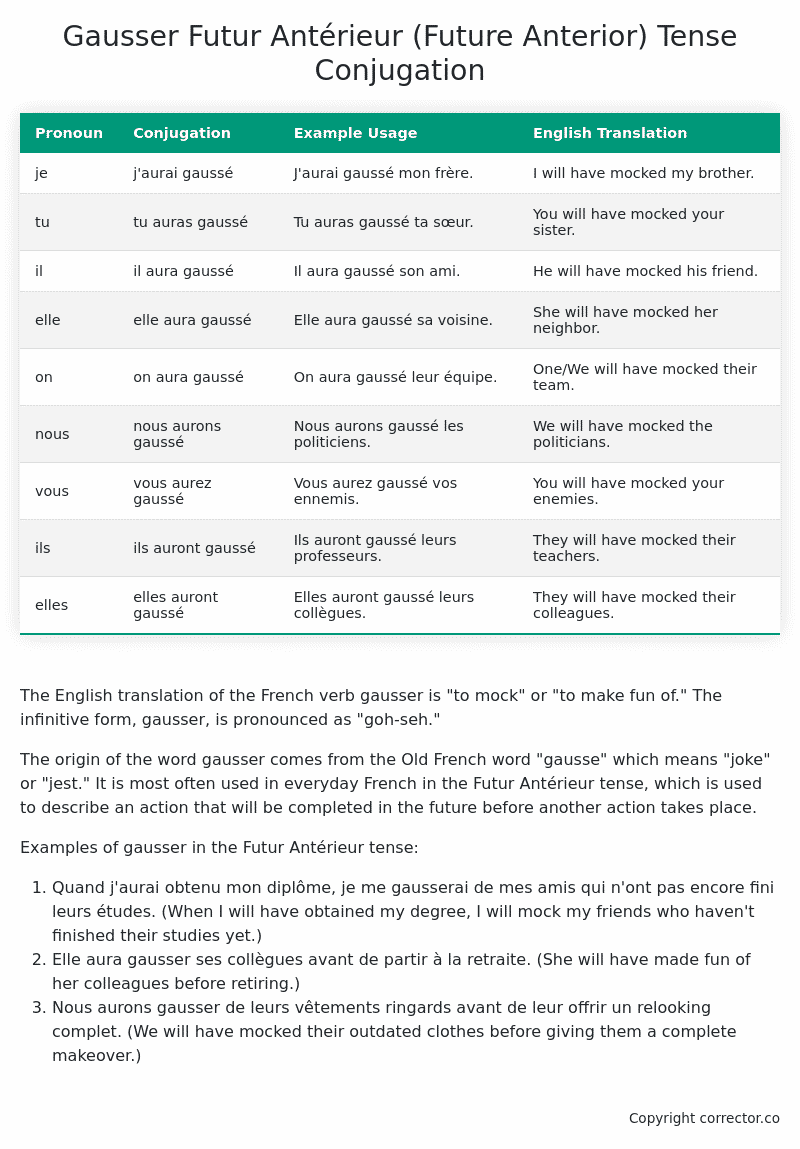Futur Antérieur (Future Anterior) Tense Conjugation of the French Verb gausser
Introduction to the verb gausser
The English translation of the French verb gausser is “to mock” or “to make fun of.” The infinitive form, gausser, is pronounced as “goh-seh.”
The origin of the word gausser comes from the Old French word “gausse” which means “joke” or “jest.” It is most often used in everyday French in the Futur Antérieur tense, which is used to describe an action that will be completed in the future before another action takes place.
Examples of gausser in the Futur Antérieur tense:
- Quand j’aurai obtenu mon diplôme, je me gausserai de mes amis qui n’ont pas encore fini leurs études. (When I will have obtained my degree, I will mock my friends who haven’t finished their studies yet.)
- Elle aura gausser ses collègues avant de partir à la retraite. (She will have made fun of her colleagues before retiring.)
- Nous aurons gausser de leurs vêtements ringards avant de leur offrir un relooking complet. (We will have mocked their outdated clothes before giving them a complete makeover.)
Table of the Futur Antérieur (Future Anterior) Tense Conjugation of gausser
| Pronoun | Conjugation | Example Usage | English Translation |
|---|---|---|---|
| je | j’aurai gaussé | J’aurai gaussé mon frère. | I will have mocked my brother. |
| tu | tu auras gaussé | Tu auras gaussé ta sœur. | You will have mocked your sister. |
| il | il aura gaussé | Il aura gaussé son ami. | He will have mocked his friend. |
| elle | elle aura gaussé | Elle aura gaussé sa voisine. | She will have mocked her neighbor. |
| on | on aura gaussé | On aura gaussé leur équipe. | One/We will have mocked their team. |
| nous | nous aurons gaussé | Nous aurons gaussé les politiciens. | We will have mocked the politicians. |
| vous | vous aurez gaussé | Vous aurez gaussé vos ennemis. | You will have mocked your enemies. |
| ils | ils auront gaussé | Ils auront gaussé leurs professeurs. | They will have mocked their teachers. |
| elles | elles auront gaussé | Elles auront gaussé leurs collègues. | They will have mocked their colleagues. |
Other Conjugations for Gausser.
Le Present (Present Tense) Conjugation of the French Verb gausser
Imparfait (Imperfect) Tense Conjugation of the French Verb gausser
Passé Simple (Simple Past) Tense Conjugation of the French Verb gausser
Passé Composé (Present Perfect) Tense Conjugation of the French Verb gausser
Futur Simple (Simple Future) Tense Conjugation of the French Verb gausser
Futur Proche (Near Future) Tense Conjugation of the French Verb gausser
Plus-que-parfait (Pluperfect) Tense Conjugation of the French Verb gausser
Passé Antérieur (Past Anterior) Tense Conjugation of the French Verb gausser
Futur Antérieur (Future Anterior) Tense Conjugation of the French Verb gausser (this article)
Subjonctif Présent (Subjunctive Present) Tense Conjugation of the French Verb gausser
Subjonctif Passé (Subjunctive Past) Tense Conjugation of the French Verb gausser
Subjonctif Imparfait (Subjunctive Imperfect) Tense Conjugation of the French Verb gausser
Subjonctif Plus-que-parfait (Subjunctive Pluperfect) Tense Conjugation of the French Verb gausser
Conditionnel Présent (Conditional Present) Tense Conjugation of the French Verb gausser
Conditionnel Passé (Conditional Past) Tense Conjugation of the French Verb gausser
L’impératif Présent (Imperative Present) Tense Conjugation of the French Verb gausser
L’infinitif Présent (Infinitive Present) Tense Conjugation of the French Verb gausser
Struggling with French verbs or the language in general? Why not use our free French Grammar Checker – no registration required!
Get a FREE Download Study Sheet of this Conjugation 🔥
Simply right click the image below, click “save image” and get your free reference for the gausser Futur Antérieur tense conjugation!

Gausser – About the French Futur Antérieur (Future Anterior) Tense
Construction
Common Everyday Usage Patterns
Interactions with Other Tenses
For example
Summary
I hope you enjoyed this article on the verb gausser. Still in a learning mood? Check out another TOTALLY random French verb conjugation!


